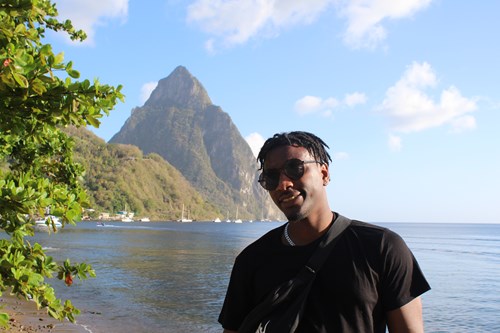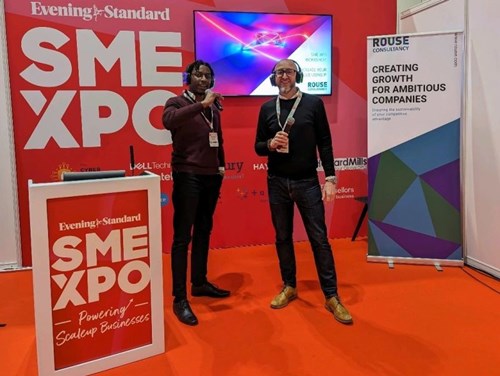Ryan is an Intellectual Asset Analyst with Rouse Consultancy, based in our London office. He helps clients both understand the value and potential of their Intellectual Property and integrate their IP strategies into the overall business plan.

South East Londoners are often described as having a strong sense of local community, a positive attitude and sense of fun, and a readiness to embrace change. All that is certainly true of Ryan, a truly proud South East Londoner, but it’s far from the full picture. He has other personal attributes – not least a lively intellectual curiosity – as well as a particular family background and educational experience, that sets him apart
In his early schooldays in South East London, Ryan was definitely one of the boys, joining in whatever was going, but he was also blessed with a natural desire to learn and the ability to learn quickly. He was particularly good at Maths and Sciences, and very much a self-starter, always planning ahead. When he was 11 he had a paper-round, saving his money so that, when he wanted something in particular, he would be in a position to get it.
When he was about to enter secondary school, his mother decided to apply for a teaching position at the International School in Brunei, on the north coast of the island of Borneo, and the whole family moved there. For Ryan it was a massive change: moving from his South London school, where the teachers had to work to make themselves heard, to one of the oldest and most distinguished international schools in South East Asia, where there was silence the minute a teacher walked into the classroom. He adapted very well. He had always been good at picking up signals, seeing what behaviour is appropriate, and this enabled him to fit in relatively easily with students from all over the world. It turned out to be a positive and life-changing experience. For practical reasons, however, it was decided that he should return to the UK for his final year of school.
It was pretty much a foregone conclusion that he would go on to university and study Engineering. He looked for any university with a good general Engineering course and chose the University of Exeter. It involved living away from home, but after adapting to life at the International School in Brunei, that wasn’t at all daunting. He enjoyed his university days enormously. Early on he formed a group of like-minded friends: fun loving, but also serious about study. They have all gone on to other things, from marketing to investment banking, but are still in regular contact – and probably always will be.
Between his first and second year at Exeter, Ryan spent some time as an intern with a world-class engineering services and nuclear engineering organisation. There, he was part of a great team and enjoyed the work. But he realised that a career in an engineering company was not for him. A lot of the work was inevitably fairly routine, whereas he wanted something more creative and challenging.
As part of his course at Exeter, Ryan had also spent some time in Bordeaux in France where, together with other students, he worked on a project to build a model satellite, capable of being launched to 500 metres and brought down safely. Each team member had his area of responsibility – Ryan’s was circuitry and some aspects of design. It was an inspiring few months - and not only because of the engineering project. He became aware of the attraction and benefits of getting to know another culture and another language, and that had given him the idea to take some time out and travel when he graduated.
While still at University, began to put out feelers for jobs available to Engineering graduates, and one of the responses had been from a firm of Patent Attorneys. They seemed surprisingly keen, but Ryan didn’t pursue it. By then he was in the throes of his thesis, and also planning to take time out to travel.
He saved up and together with a friend set out for South America, travelling along the coast of Brazil to Rio de Janeiro and on to Iguazu and Buenos Aires in Argentina. He taught English as a foreign language and did various other jobs along the way, picking up enough Spanish, by the time he left, to be able to understand pretty much everything his workmates were talking about.
When he returned from South America, he did some research into Patent Attorneys, and Intellectual Property in general. It was eye opener: he realised that the work involved engagement with the highest level of technical innovation, and got in touch with the firm of Patent Agents who had previously seemed so keen.
He found the work with them immediately fascinating, but again, after he had been there for some time, his intellectual curiosity as well as his forward-looking nature, made him question whether he was on the right career path. He looked at the work his Managers were doing – and while they were extremely skilled and knowledgeable in their field, he realised that, four or five years hence, he wouldn’t want to be doing what they were doing. Their focus was, inevitably, on the protection of inventions. The legal parameters felt like a constraint; what really excited Ryan, was maximising an invention’s potential to the full.
And that is how he became interested in IP Asset Analysis and Management and found his way to Rouse Consultancy. Now he can focus on both the technical aspects of inventions and their full and effective exploitation. He explains it this way. “Think of a patent as a fort. Just as a fort will be much more effective when built on the top of a hill, so a patent will be much more effective when supported by and integrated with aspects of a company’s business strategy."

Outside work, Ryan enjoys hanging out time with friends, but perhaps his chief leisure pursuit is Quantum Computing. He is fascinated by it and convinced of its huge potential: he believes the UK could become a major player in the field. Given Ryan’s particular skill-set, personal attributes, interest and experience, he has the world at this feet. But wherever he goes and whatever he does, he’ll always be a proud South East Londoner at heart.